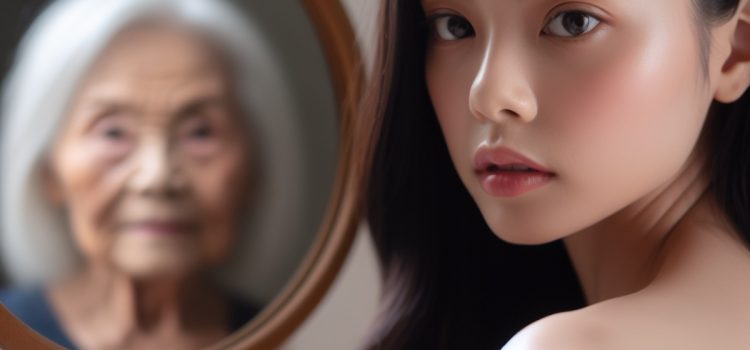

This article gives you a glimpse of what you can learn with Shortform. Shortform has the world’s best guides to 1000+ nonfiction books, plus other resources to help you accelerate your learning.
Want to learn faster and get smarter? Sign up for a free trial here .
Are there ways to slow down the aging process? How do hormones speed up biological aging?
While there’s no way to stop or reverse aging, you can certainly slow down the process to live a longer life. Since aging refers to the decline of a person’s health, there are several remedies you can use to stay youthful for as long as possible.
Learn how to age slower by rebalancing your hormones, nourishing your body, and more.
What Is Aging?
In Ageless, Andrew Steele uses the word “aging” to refer to the process that causes our health to decline—and our likelihood of getting sick or dying to grow—as we age. A key insight is that the diseases that kill us occur because of the aging process. Steele explains that age is the most significant risk factor for heart disease, stroke, dementia, and cancer, which we often think of as causes of death. He contends that because aging sets these diseases into motion, aging itself is the cause of approximately two-thirds of deaths globally.
Steele explains that even if we don’t develop heart disease or cancer as we get older, none of us are immune to the effects of aging. As we age, we experience more minor physical and mental changes that might not be considered diseases, but still reduce our quality of life: We get less physically fit, our health worsens, and our thinking and memory decline. Steele sees aging as a problem of human suffering—suffering that doesn’t have to be our fate.
Slowing Down the Aging Process
Though much of that science is still in the research stage, Steele writes that scientists already have enough evidence to know there are things you can do right now to increase your chances of living a long and healthy life. Much of the advice on how to age slower—like getting better sleep—won’t sound novel. But these measures are effective at keeping us fit and healthy as we age.
1. Quit Smoking and Start Exercising
The first change to make to age slower is to quit if you currently smoke. Smoking increases your risk of cancer, reduces DNA mutations, and causes chronic inflammation linked to cardiovascular disease. Ageless says that while smoking reduces lifespan by 10 years, quitting at age 30 restores life expectancy to normal.
A second change that can impact your health is shifting from a sedentary lifestyle to a routine with daily exercise. That change reduces your risk of death and disease, boosts your metabolism, improves the condition of your muscles and bones, and reduces inflammation.
2. Rebalance Your Hormones
In Super Human, Dave Asprey argues that hormones play a key part in how well mitochondria function because they help maintain your overall health (thereby reducing the damaged and dysfunctional cells mitochondria must deal with).
As you age, your body slows down its production of certain hormones, such as testosterone and estrogen, resulting in an imbalance that can cause many of the undesirable symptoms we associate with old age. These symptoms include mood swings, weight gain, poor sleeping patterns, low fertility levels, and sexual dysfunction.
Asprey claims that old age isn’t the only cause of hormonal imbalances. Various other factors can disrupt your hormones, such as a lack of sleep or nutrition, a sedentary lifestyle, using personal care products made with hormone-disrupting chemicals, and taking prescription medications or hormonal birth control.
Four Methods for Rebalancing Your Hormones
Asprey suggests four methods that can help you prevent or reverse hormonal imbalances.
- Practice high-intensity exercises a few times a week.
- Replace chemical-laden products with natural ones.
- Check the effects of any prescription medications.
- Find replacements for hormonal birth control.
If changing your lifestyle doesn’t help to rebalance your hormones, Asprey recommends undertaking bioidentical hormone replacement therapy (BHRT). Bioidentical hormones are chemically identical to those your body naturally produces—which makes it easier for your body to assimilate them into your hormonal makeup. These hormones can be administered in various ways—through injections, by taking pills, or by putting on patches or creams.
3. Get Better Sleep
According to Super Human, sleep deprivation results from missing out on good-quality sleep that maximizes your time in deep sleep (otherwise known as “delta sleep”). This phase of sleep provides many health benefits: It regulates your hormones, improves your cognitive abilities, reduces your stress levels, and helps your mitochondria eliminate cellular waste—all of which can slow down aging.
The first lifestyle change for improving your sleep quality is to adapt your lighting. Asprey explains that you’re more likely to suffer from sleep deprivation if you’re regularly exposed to blue light from LED bulbs and screens. This is because your body’s natural sleep cycle is designed to match the rhythm of the sun: During sunlight hours, your body releases chemicals that make you feel alert and active. When the sun goes down, your body releases chemicals that make you want to sleep and recover. However, blue lighting disrupts this sleep cycle by making your body think that the sun’s out all the time.
Asprey suggests that you can minimize this disruption to your sleep cycle by replacing the lighting in your environment with red bulbs, turning off all screens, dimming your lights two hours before you plan to sleep, and wearing glasses that filter out blue light. He also recommends that you spend ten to twenty minutes in the sun each morning (before the sun’s at its most powerful) to balance your exposure to artificial light sources.
In addition to adapting your light sources, Asprey suggests that you can improve the quality of your sleep by tracking your sleeping patterns. Asprey recommends using a sleep tracker that also gathers data from your daytime activities. This type of tracker will reveal how your daytime activities impact the quality of your sleep—providing information that will help you make lifestyle decisions that maximize your time in deep sleep. For example, it might reveal that you benefit from more time in deep sleep when you exercise or eat certain foods during the day.
4. Nourish Your Body
In addition to exercising correctly, eating a healthy diet is key to maintaining your physical and mental capabilities in old age. Outlive by Peter Attia emphasizes that what you should eat depends on your unique body—no diet’s universally the “healthiest” for everyone. Everyone’s body metabolizes food differently, so the same diet might help one person and harm another.
Although there’s no universally optimal diet, Attia offers broad dietary advice that would improve the health of most people. In modern times, many follow what’s called the Standard American Diet, which is heavy in processed, sugary foods. Consequently, they consume too many calories, yet they still don’t get enough of some key nutrients (especially protein, as we’ll see soon).
As part of his suggestions on how to age slower, Attia asserts that most people should do the following:
- Eat more protein
- Eat fewer carbohydrates
- Complete their diet with fats
- Only fast if they have metabolic dysfunction
Finally, as a side note, Attia states that as long as your metabolism is relatively healthy, practicing the ideal exercise routine is more important than consuming the ideal diet. Although fixing your diet is essential if you’re suffering from intense insulin resistance, perfecting your diet yields far fewer health benefits than perfecting your exercise routine.
5. Use Heat and Cold Therapy
Life Force by Tony Robbins, Peter H. Diamandis, and Robert Harir advises using heat therapy and cold therapy to prevent the onset of disease and pain.
For heat therapy, they recommend using a sauna for about 20 minutes a few times a week at a temperature of 163 degrees Fahrenheit, noting that it reduces the risk of premature death from all causes by 40%. It also reduces the risk of heart disease, dementia, arthritis, depression, and stroke.
For cold therapy, they recommend whole-body cryotherapy, which involves spending just two or three minutes in a chamber filled with gas as cold as negative 240 degrees Fahrenheit with almost no clothing. This provides a shock to the system that dramatically reduces pain and inflammation. The authors also say that you can use ice plunges if you don’t have access to a cryotherapy chamber. This involves submerging your body in ice water for two minutes and it achieves some of the same results as whole-body cryotherapy.
6. Catch Illnesses Early
Life Force explains how to age slower by taking advantage of modern technology. Diagnostic testing can help you prevent illnesses or catch them at the early stages when they are most treatable. They recommend several tests, including one for heart disease and one for cancer, and they also recommend testing your hormones and levels of heavy metals in your blood. Let’s look at these different tests.
The authors recommend you get a coronary computed tomography angiography, or CCTA, a type of heart scan that shows plaque in your arteries. A new method of this testing created by a company called Cleerly uses artificial intelligence to distinguish between types of plaque, some of which are more harmful than others and can be early indicators of heart disease.
The authors also recommend a yearly full-body MRI combined with a comprehensive blood test to detect cancer, noting that the survival rate for early-detected cancer is nearly 90% while the survival rate for late-detected cancer is just over 20%. The blood test they recommend is called Galleri, developed by a company called GRAIL. Before the development of this test, we were only able to detect a few types of cancer before they began causing problems in a patient’s system, but this test can detect more than 50 different types of cancer, and the handful of types it can’t detect—such as brain or kidney cancer—can be detected with a full-body MRI.
You should also get your blood tested to assess your hormone levels and the presence of heavy metals in your blood. Testing your hormones annually can help you identify and compensate for irregularities through hormone replacement therapy or hormone optimization therapy.
Hormones are key to numerous bodily functions, but hormone levels begin to drop in early middle age. This negatively impacts your energy levels, your muscle mass, your fertility, your physical appearance, your blood sugar, your body’s inflammatory response, and your ability to concentrate, among many other things.
Finally, you should test your blood for toxic metals such as mercury, which can cause memory issues, exhaustion, and ultimately death. Fish often contain mercury, and if you have a diet high in fish you may be at increased risk for mercury poisoning.
Wrapping Up
It’s never too late to adopt healthy habits to get your body into shape. You may not have a miracle elixir that grants immortality, but you do have expert recommendations that will prolong your life. Once you apply the advice on how to age slower, you’ll cherish the time you have alive.
What suggestions do you have on how to age slower? Let us know in the comments below!

Want to fast-track your learning? With Shortform, you’ll gain insights you won't find anywhere else .
Here's what you’ll get when you sign up for Shortform :
- Complicated ideas explained in simple and concise ways
- Smart analysis that connects what you’re reading to other key concepts
- Writing with zero fluff because we know how important your time is






